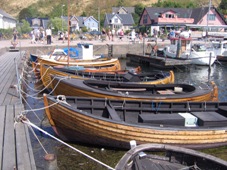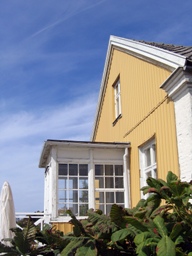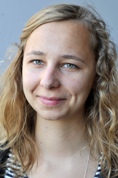Studying Swedish within European Languages and Cultures

Sweden is the country of Abba and Roxette, Stieg Larsson, Astrid Lindgren, as well as the cradle of Spotify, H&M and Ikea. It is a country that is actively recruiting emigrants from the Netherlands. What else Sweden has to offer, you will discover if you choose the Swedish specialisation within European Languages and Cultures.
Why Swedish?
Have you visited Sweden, or are you addicted to Young Royals or Bonusfamiljen? Are you curious about one of the oldest democracies in Europe or about a Northern European language that is closely related to Dutch and English? Then Swedish is a logical choice!
Swedish is also the Scandinavian language with the most medieval texts after Icelandic. The orally transferred laws were written down early and are an excellent source for the study of Sweden’s early language, politics, and culture. From the period before that, from about 800 AD, more than 4,000 rune stones have been preserved and tell their own story.
Your stay at a university abroad will boost your language proficiency. The University of Groningen has contacts with, amongst others, universities in Gothenburg, Stockholm, Uppsala and Åbo, a Finnish city where Swedish is spoken.

Swedish looks a lot like Dutch – but not quite enough for a Dutch person to read or understand the language, which is what a lot of Dutch people soon find out when they emigrate to Sweden to start up a farm, campsite or flower shop. The demand for courses and lessons in Swedish is so high that a lot of University of Groningen students of Swedish already have part-time jobs as a teacher during their studies.
Students of European Languages and Cultures specialising in Swedish find jobs as translators, interpreters, teachers, researchers or as employees in embassies, cultural organizations or political institutions within the EU. There are also many international companies that are looking for people who speak Swedish. Several alumni have found a jobs in one of the Scandinavian countries.
Back to European Languages and Cultures .

Marjoleine Gaastra (student of ELC Swedish)
Sweden is a beautiful country! The nature, the language, the cities... I would love to get to know and understand the country better. Now that I am studying Swedish as a specialization within European Languages and Cultures, I am learning a lot about Sweden and the Swedish language, but also about the position of Sweden within Europe.
Just like myself, most students choose the degree programme in European Languages and Cultures simply because they are interested in their chosen language and country. And this is reflected in the fun and commitment they show during class.
I find learning the language the most challenging part of my studies. When I started in September, I didn’t speak a word of Swedish, but I’ve already learned a lot. The course units I am now following are also very interactive, which means you don’t just listen to the lecturer but you actively participate, and you are encouraged to speak Swedish as much as possible in class. My fluency is improving very rapidly.
